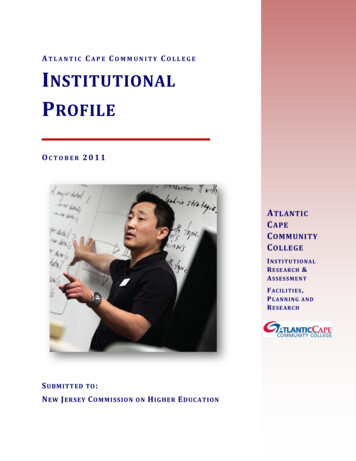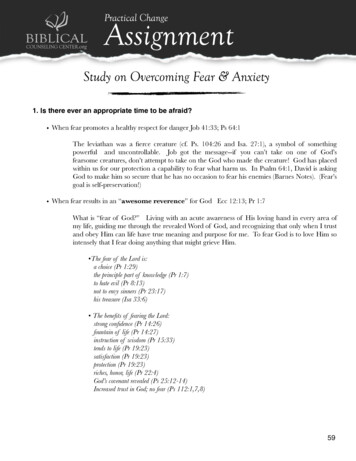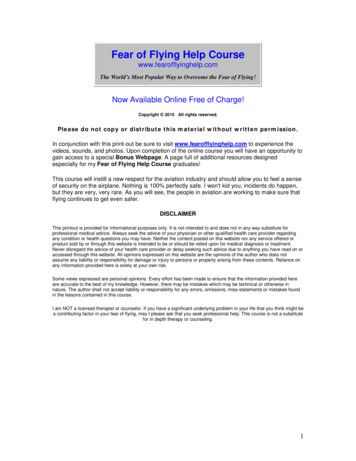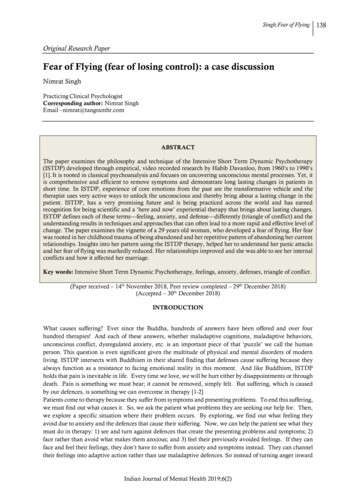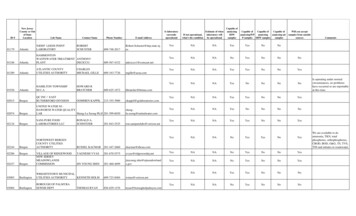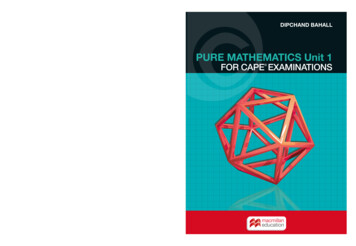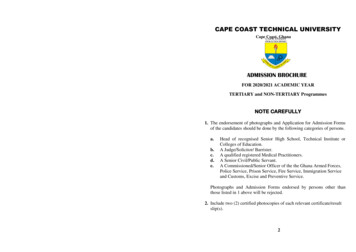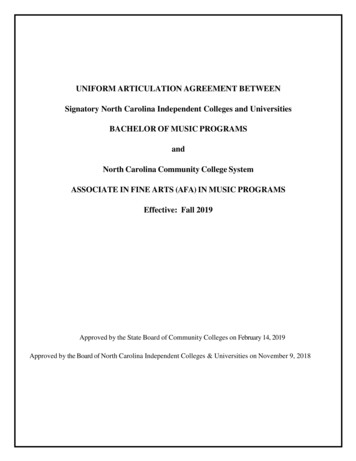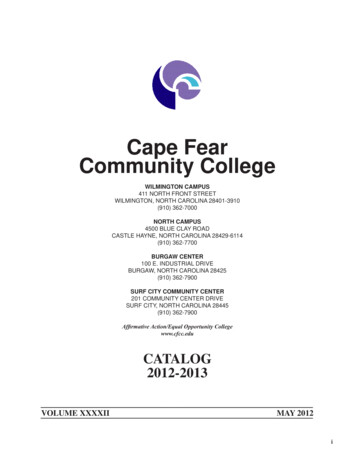
Transcription
TABLE OF CONTENTSCape FearCommunity CollegeWILMINGTON CAMPUS411 NORTH FRONT STREETWILMINGTON, NORTH CAROLINA 28401-3910(910) 362-7000NORTH CAMPUS4500 BLUE CLAY ROADCASTLE HAYNE, NORTH CAROLINA 28429-6114(910) 362-7700BURGAW CENTER100 E. INDUSTRIAL DRIVEBURGAW, NORTH CAROLINA 28425(910) 362-7900SURF CITY COMMUNITY CENTER201 COMMUNITY CENTER DRIVESURF CITY, NORTH CAROLINA 28445(910) 362-7900Affirmative Action/Equal Opportunity Collegewww.cfcc.eduCATALOG2012-2013VOLUME XXXXIIMAY 2012i
CAPE FEAR COMMUNITY COLLEGENOTEThe catalog and handbook are published for the purpose of providing information about the College and its programs. Announcements containedherein are subject to change without notice and may not be regarded in the nature of binding obligations on the College or the State. Efforts willbe made to keep changes to a minim um, but changes in policy by the North Carolina State Legislature, the North Carolina Community CollegeSystem, or by local conditions may make some alterations in curricula, fees, etc., necessary.NON-DISCRIMINATION POLICYCape Fear Community College, its faculty and staff, and the Board of Trustees are committed to equality of educational opportunity. The Collegedoes not discriminate against applicants, students, or employees. Moreover, the College is committed to cultural diversity and actively seeks largernumbers of minorities within the College community. This policy applies to both students and employees at all levels of the Colleges operations.INSTITUTIONAL ACCREDITATIONCape Fear Community College is accredited by the Commission on College of the Southern Association of Colleges and Schools to award associate degrees. Contact the Commission on Colleges at 1866 Southern Lane, Decatur, Georgia 30033-4097 or call (404) 679-4500 for questionsabout the accreditation of Cape Fear Community College.Cape Fear Community College (CFCC) provides the above information to enable interested constituents (1) to learn about the accreditation statusof CFCC, (2) to file a third-party comment at the time of CFCC's decennial review, or (3) to file a complaint against CFCC for alleged non-compliance with a standard or requirement. The Commission on College's should be contacted only if there is evidence that appears to support CapeFear Community College's significant non-compliance with a requirement or standard. Otherwise, the Commission on College's website providesmembership information and accreditation status of its members at www.sacscoc.org. All other inquiries about Cape Fear Community Collegeshould be addressed directly to the college and not to the Commission on College's office.MEMBER OFCape Fear Community College is a member institution of the North Carolina Community College System, the League for Innovation in Community Colleges, and the American Association of Community Colleges.ACCREDITATIONS AND CERTIFICATIONS OF SELECT PROGRAMSAssociate Degree Nursing: The National League for Nursing Accrediting Commission, Inc. The address and telephone number of the NationalLeague for Nursing Accrediting Commission, Inc. is 3343 Peachtree Road NE, Suite 500, Atlanta, GA 30326, (404) 975-5000.Criminal Justice Technology: The North Carolina Criminal Justice Education and Training Standards Commission. The address and telephonenumber of the North Carolina Criminal Justice Education and Training Standards Commission is NC Criminal Justice Standards Division, NCDepartment of Justice, 114 West Edenton Street, PO Drawer 149, Raleigh, NC 27602, (910) 716-6470.Dental Assisting: The Commission on Dental Accreditation of the American Dental Association. The address and telephone number of the Commission on Dental Accreditation of the American Dental Association is 211 East Chicago Avenue, Chicago, IL 60611-2678, (312) 440-4653.Dental Hygiene: The Commission on Dental Accreditation of the American Dental Association. The address and telephone number of the Commission on Dental Accreditation of the American Dental Association is 211 East Chicago Avenue, Chicago, IL 60611-2678, (312) 440-4653. Thedental hygiene program is accredited without reporting requirements.Medical Sonography: The Medical Sonography Program is accredited by the Commission on Accreditation of Allied Health Education Programs(CAAHEP) in cooperation with the Joint Review Committee on Education in Diagnostic Medical Sonography (JRC-DMS). The address and telephone number of CAAHEP is 1361 Park St., Clearwater, FL 33756, (727) 210-2350. The address and telephone number of the JRC-DMS is 2025Woodlane Dr., St. Paul, MN 55125-2998, (651) 731-1582.Occupational Therapy Assistant: The Accreditation Council for Occupational Therapy Education (ACOTE of the American Occupational TherapyAssociation (AOTA), located at 5720 Montgomery Lane, PO Box 3220, Bethesda, MD 20824-1220, (301) 652-AOTA.Pharmacy Technology: The American Society of Health System Pharmacists (ASHP), 7272 Wisconsin Avenue, Bethesda, MD, 20814, (301) 6573000, www.ashp.org.Phlebotomy: The National Accreditation Agency for Clinical Laboratory Sciences, 8710 W. Bryn Marr Avenue, Suite 670, Chicago, IL 606313415, (773) 714-8880.Practical Nursing: The North Carolina Board of Nursing, PO Box 2129, Raleigh, NC 27602, (919) 782-3211, www.ncbon.org.Radiography: Joint Review Committee on Education in Radiologic Technology, 20 N. Wacker Drive, Suite 2850, Chicago, IL 60606-3182,(312) 704-5300, www.jrcert.org.Surgical Technology: Commission on Accreditation of Allied Health Programs (CAAHEP), 1361 Park Street, Clearwater, FL 33756,(727) 210-2350ADMISSION TO ANY AND ALL EDUCATIONAL PROGRAMS OFFERED BY CAPE FEAR COMMUNITY COLLEGE IS MADEWITHOUT REGARD TO RACE, COLOR, SEX, RELIGION, NATIONAL ORIGIN, PHYSICAL HANDICAP OR OTHERNON-RELEVANT FACTORS.ii
TABLE OF CONTENTSTable Of ContentsPresident’s Welcome.1College Calendar.3Local Board of Trustees.1Mission Statements.2Vision Statement.2State Board of Community Colleges.1About the College.2Admissions.5Admission of International Students.7Admission of Non-degree Seeking Student.5Admission of Out-of-State Students.7Admission of Transfer Students.5Admission of Transient Students.6College Opportunities for High School Students.6 .General Admissions Process.7.Provisional Admission.6Re-Admission of Curriculum Students.6Selective Admissions/Health Science Programs.5Special Credit-Lifelong Learners.6Services to Students.8Accuplacer Test.9Basic Skills Division.17Campus Visits.8.Career and Testing Services.9Continuing Education Services.16Counseling.8.Developmental Studies.11Disability Support Services.9.GED Testing.9Health Services.16Human Resources Development Program.17Learning Lab.16Learning Resources Center.16List of Transfer Courses.11myCFCC.8Orientation.8Placement Test Advising Guide.10.Placement Testing.9Placement Testing Options.9.Retention and Graduation Rate Information.9Retest Policy.9WebAdvisor.8Where to Go for What.8Registration Information.17Auditing Courses.17Course Load.17Procedures for Registering for Classes.17.Semester Hour Credit.17Semester System.17WebAdvisor (Online Registration).17Withdrawal.17Academic Information.18Academic Forgiveness.24Academic Program Change.23Academic Program of Study.23Academic Warning, Probation and Suspension.25Advanced Placement.21.Attendance.19Catalog of Record.26Cheating and Plagiarism.25CLEP - College Level Examination Program.21College Closings or Delays.19Computer Competency.26Course Repeat Policy.24Credit by Proficiency.21Degree Audit.26Educational Partnerships.22Experiential Learning.23Final Grades.21Grade Appeal Procedure.24Grading and Grade Point Averages.18Grading Scale.18Grading System.18Graduation Needs.27Inclement Weather.19Incomplete Grades.21Independent Study.23Intent to Graduate.26North Carolina High School to Community CollegeArticulation Agreement.23Off-Campus Groups and Individuals.20On-Campus Groups and Individuals.19Partnerships with Business and Industry.22Partnerships with Community Agencies.22Prerequisites and Corequisites.26Re-enrollment after Academic Suspension.25Requirements for Graduation.26Right of Appeal.25Right of Appeal (Cheating).25Satisfactory Progress Standards.25Scholastic Honors.27Student Advisement.18Student Participation in CFCC Activities.20Translating Course Grades into GPA.19Waiver of Prerequisites and Corequisites.26iii
CAPE FEAR COMMUNITY COLLEGEFinancial Aid.27Appeal Process for Probationary Semester.29Applying for Financial Aid.27Available Aid Programs.27Eligibility After Graduation.28Failure to Achieve Satisfactory Academic Progress.29Financial Need and Expected Family Contribution.28Foundation Scholarships.31Maintaining elegibility forVeterans Educational Benefits.45Maximum Time Frame.30Maximum Time Frame Appeal.30Notification of Awards.28Programs Not Eligible for Financial Aid.28Qualitative and Quantitative Standards.29Return of Federal Funds.30Satisfactory Academic Progress.28Student Ambassadors.44Student Responsibilities.30Timing of Veterans Educational Benefits.45Vocational Rehabilitation.45Expenses.45Bookstore.46Electronic Signature Policy for Students.45Graduation Fees.47Institutional Indebtedness.47Insurance.46Parking and Security Permits.46Personnel in the Armed Services.47Refund of Tuition.46Return Check Guidelines.47Student Fees.45Student Identification Card.46Textbooks and Educational Tools.46Transcript of Record.47Tuition .45Student Activities.47Athletics and Intramural Activities.47Clubs and Organizations.48College Sponsored Activities and Events.50Intramural Program.47Phi Theta Kappa.48Social Activities.48Student Ambassadors Program.48Student Government Association.48Student Publications.50ivGeneral Information.51Change of Name/Address.51Children on Campus Policy.51Dress.51Food Services.51Housing.51Lost and Found.51Parking.51Telephones.51Tobacco Free Campus Policy.51Student Expectations, Rights and Responsibilities.52Campus Sex Crimes Prevention Act.56Classroom Rules.55Code of Conduct.54Computer Acceptable Use Policy.53Conduct Probation and Suspension.55Crime Awareness and Campus Security Policy.55Crime Data.56Directory Information.53Drug and Alcohol Policy.58Emergency Evacuation.58Evacuation of Buildings.57Grievance Procedure.57Judicial Board.56Patent and Copyright Policy.53Right of Appeal.55Rights of Administration.53Rights of Faculty.52Rights of Parents.52Rights of Students.52Sex Offender Notification.56Sexual Harassment.57Student and Public ComplaintPolicy and Procedures.57Student Records.52Weapons on Campus.55Written Student Complaint.57Extended Services-Continuing Education.60Basic Skills Division.62Burgaw Center.69Corporate and Continuing Education Division.63General Course Information.60Public Health and Safety Division.65Recreation and Leisure Programs.67Surf City Community Center.69Distance Learning.69Programs of Study.70General Education Values Statement.72College Transfer General Informationand Articulation Agreements.72
TABLE OF CONTENTSCollege Transfer Programs.81Associate in Arts General Studies.81Associate in Science General Studies.85Associate in Arts Pre-MajorsArt Education.89Business Administration, Accounting, Economics,Finance and Marketing.93Business Education and Marketing Education.96Communication/Communication Studies.99Criminal Justice.102Elementary Education.105English.110English Education.113History.117Information Systems.120Mass Communication/Journalism.123Middle Grades Education.126Nursing.129Political Science.131Psychology.134Social Work.137Sociology.140Special Education.143Associate in Fine Arts Pre-MajorArt.146Drama.149Music and Music Education.153Associate in Arts DiplomaGeneral Studies.156Associate in Science DiplomaGeneral Studies.159Associate in General Education.162Associate in Applied Science, Diplomaand Certificate ProgramsAccounting.162Air Conditioning, Heating& Refrigeration Technology.163Architectural Technology.164Associate Degree Nursing.164/201Automotive Mechanics.165Basic Law Enforcement Training.166Boat Building.167Boat Manufacturing and Service.167Business Administration.168Banking and Finance.168Customer ical Technology.170Collision Repair and Refinishing Technology.171Community Spanish Interpreter.171Computer Engineering Technology.173Networking.174Security.174Web Development.174Computer Information Technology.175Computer-Integrated Machining.176Construction Management Technology.177Cosmetology.178Criminal Justice Technology.179Culinary Arts.181Dental Assisting.182Dental Hygiene.182Drafting.183/196Early Childhood Education.184Electrical/Electronics Technology.185Electronics Engineering Technology.186Esthetics Instructors.187Esthetics Technology.187Film and Video Production Technology.188Fire Protection Technology.189Hospitality Management.190Industrial Systems Technology.191Interior Design.192Landscape Gardening.193Retention Pond Management.194LPN Refresher.194/201Manicuring/Nail Technology.194Marine and Diesel Mechanics.194Marine Technology.195Mechanical Engineering Technology.196CAD Drafting.197Medical Office Administration.198Medical Sonography.198Medical Transcription.199Nuclear Technology.200Nursing ProgramsAssociate Degree Nursing (RN).201LPN Refresher.201Practical Nursing (LPN).202Occupational Therapy Assistant.202Paralegal Technology.203Pharmacy Technology.205Phlebotomy.206Plumbing.207Practical Nursing (LPN).202/207Radiography.207Real Estate.208Surgical Technology.209Sustainability Technologies.209Truck Driver Training.211Welding Technology.211Course Descriptions.212Staff and Faculty.332Index .350v
CAPE FEAR COMMUNITY COLLEGEPerformance Measures and StandardsIn February 1999, in response to a mandate from the NC General Assembly to review past performance and define standards ofperformance to ensure the quality and effectiveness of programs and services, the NC State Board of Community Colleges adopted12 performance measures for all 58 community colleges as the core indicators of student success for public accountability purposes.In 2007, the NC General Assembly approved modifications to the NC Community College Performance Measures and Standardsas recommended by the NC State Board of Community Colleges. The modifications, effective immediately, reduced the number ofmeasures from 12 to 8, but require colleges to meet all standards plus †additional criteria for measures 2 and 3 below to qualify forthe Exceptional Institutional Performance funding. CFCC’s performance results for 2009-2010 are:Performance MeasureStandardCFCC Performance1. Progress of Basic Skills Students75% of adult literacy students will complete a level, progresswithin a level, or complete a predetermined goal.2. Passing Rates on Licensure andCertification Examinations by First TimeTest Takers80% of first-time test takers will pass examinations requiredfor North Carolina licensure or certification.76% progressed(3,862literacy students servedby CFCC)1. Aggregate score: 96%2. Number of Exams with a passing rate 70%: 0Individual scores:Cosmetology-*Cosmetology Apprentice-100% (11tested)Manicurist-*Esthetics-*Dental Hygiene-100% (11 tested)Radiography-100% (22 tested)PN-100% (19 tested)ADN-98% (57 tested)EMT-95% (172 tested)EMT-P-*EMT-I-87% (15 tested)BLET-84% (85 tested)Real Estate Sales-83% (12 Tested)* number too small to report withoutviolating privacy laws†CFCC met additional criteria for thismeasure3. Performance of College TransferStudents83% of students transferring to a university with an associatedegree or 24 articulated college transfer credit hours will havea GPA equal to or greater than 2.00 after 2 semesters at theuniversity.†Additional criteria to qualify for the Exceptional InstitutionalPerformance Standard—Meet or exceed the aggregate performance of native UNC sophomores and juniors, which is 87%for this year.87%- Associate Degree recipients had a2.0 GPA or higher84%- Transfers w/o degree but transferring with 24 or more semester hours hada 2.0 GPA or higher85% of all qualifying transfer studentsachieved a GPA of 2.0 or better4. Passing Rates of Students inDevelopmental Courses75% of developmental course completers in English,reading or mathematics will complete with a grade “C” orbetter.78% (of 4,366) combined, English andMath79% (of 1,629) completed English witha “C” or better77% (of 2,737) completed math with a“C” or better5. Success Rates of Developmental Studentsin Subsequent College-Level Courses80% of college level English or mathematics coursecompleters with previous developmental coursework willcomplete the college level English or mathematics coursewith a grade of “D” or better.79% (1,092) combined, English andMath78% (of 611) completed in subsequentcollege-level English courses79% (of 481) completed in subsequentcollege-level math co
Cape Fear Community College is accredited by the Commission on College of the Southern Association of Colleges and Schools to award as-sociate degrees. Contact the Commission on Colleges at 1866 Southern Lane, Decatur, Georgia 30033-4097 or call (404) 679-4500 for questions about the accreditation of Cape Fear Community College.


